We are developing the social individualist meta-context for the future. From the very serious to the extremely frivolous... lets see what is on the mind of the Samizdata people.
Samizdata, derived from Samizdat /n. - a system of clandestine publication of banned literature in the USSR [Russ.,= self-publishing house]
|
There’s a new social trend in Belfast whereby women are dropping their children off to school still in their pajamas. This has got the local worthies of Belfast worried, and a little peeved.
In a bulletin to parents, Mr McGuinness wrote: “Over recent months the number of adults leaving children at school and collecting children from school dressed in pyjamas has risen considerably.
“While it is not my position to insist on what people wear, or don’t, I feel that arriving at the school in pyjamas is disrespectful to the school and a bad example is set to children.”
Women walking round Belfast estates in all-day pyjama gear is a phenomenon that has been well documented by Robin Livingstone, a columnist in the Andersonstown News, but until now it has been confined to the west of the city.
Mr Livingstone said that he first identified All Day Pyjama Syndrome (ADPS) in 2003. He knows a student at the Belfast Institute for Further and Higher Education who is writing a dissertation on the subject.
The women are colloquially known as “pyjama mamas” or “Millies”. Their pyjama ensembles are often complemented by large, gold hoop earrings known as “budgies” – because such cage birds could swing from them. They also sport “scrunchies” to create the “Turf Lodge facelift”, in which the hair is scraped so tightly to the back of the head that it pulls the facial skin taut.
There is even a dress hierarchy among those suffering from APDS: the wearing of silk-effect, baggy pyjamas with fluffy, mule-type slippers contrasts, for example, with the traditional dressing gown and hair rollers.
Bloggers, who of course are famous for working in their pajamas, should rally around the millies, and defend their right to drop off their offspring at school, no matter how unsightly it may appear.
First they came for the millies….
The Irish government has this week succeeded in their plans to help restore a monopoly in health insurance, as the main private insurer was yesterday forced to withdraw from business, leaving the state behemoth with only one tiny rival left to prevent it from controlling the market. Risk equalisation payments which cost them a million €uro every week left BUPA with no choice but to leave.
For those unacquainted with the health insurance market, risk equalisation is a device designed to underpin community rating: a regulation of health insurance whereby the level of risk a consumer poses to an insurer must not affect the premium paid; i.e. everyone must be offered the same products at the same price regardless of their age, gender, or personal health characteristics. A sceptical observer might wonder why a healthy young person should have to pay the same as a sick geriatric, or in what sense this is really insurance at all. Well, the justification given is that, without this scheme, and the associated regulations of lifetime cover and open enrolment, no-one would be willing to offer sick or old people a health plan they could afford. Therefore, the argument goes, it is acceptable that young people are overcharged in order to prevent this. Community rating is designed to produce inter-generational subsidies, and is a clear example of cradle-to-grave statism.
However, community rating alone does not fully prevent competition – it is possible for more than one insurance company to offer community-rated products simultaneously, as indeed was the case in Ireland for the last ten years. It’s a heavily regulated market (imagine if car insurers were not allowed to discriminate according to the risk profile and vehicles of their customers, or house insurance had to ignore the likelihood of flooding or earthquakes in any particular area), but we proved that it can exist sustainably.
So, to really cut out competition, there are several other things you have to do. The first thing that the Irish government did for the last number of years was to give its dominant state provider preferential treatment with respect to the requirements of its solvency reserves. While that did hurt the private operators, it did not totally force them out of business. So our supposedly pro-market government decided to trigger risk equalisation: a device which is theoretically meant to correct discrepancies between customer bases by forcing insurers with younger customers to subsidise their rivals with older, costlier, riskier members. In our case, what it actually did was threaten the main private insurer with having to subsidise its wealthy state rival with nearly three times its operating profits, for little discernible reason and despite clear, logical protests from professional economists in Ireland’s major universities (for example listen to this file).
The result of all of this: BUPA is forced to quit, leaving increased power to the state company. According to leaked documents, this company is preparing to increase its premiums by 15% each year over the next three years, clearly exploiting its position of power to the fullest. The public has been duped, and has absolutely no clue.
What’s more, no-one is going to stand up for them. An Taoiseach (Prime Minister) Bertie Ahern revealed his lack of understanding of the issues by launching an ignorant attack against BUPA. The powerful trade union controlling the state monopoly then announced that it would fight against any efforts to break up this company into competing units. And the mainly left-wing opposition has, predictably, come up short in its handling of this issue.
My question is this: what would you call a private business that was able to intimidate and then forcefully eliminate anyone who dared to compete with it? That’s right, you would call it a highly organised criminal outfit. So why is the government any different?
Although I have lived in Belfast for a very long time, I have rarely written about it, primarily because of hate-mongering gits who turn any mention of Northern Ireland into an excuse for personal attack and pointless flaming. So… if you are one of them, go away. This article will bore you and any attempt to discuss politics will be deleted on sight.
Few of our readers have the slightest knowledge of Belfast outside of what is written over drinks in the Europa Hotel bar or from live media feeding frenzies where a handful of rioters get photographed, filmed and interviewed by a small army of bleeding-lede starved media mavens. This creates a distorted view of our town and has virtually no relationship to the daily lives of anyone who lives here. The ‘exciting’ Belfast is long gone. This is not to say we do not have some problems with hooligans, particularly around July 12th…
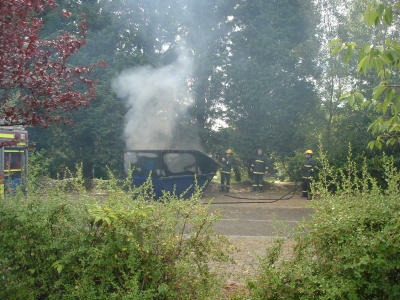 Photo: Dale Amon, all rights reserved Photo: Dale Amon, all rights reservedReporters at the Europa missed this one!
What the reporters do not bother to show you is that this is an incredibly beautiful place. When we get a perfect day like today, It is simply stunning. That is what this article is about. Nothing newsworthy. Nothing political. I simply went shopping, about a mile or two of walking on foot, and took a few photos to share with you. Since the small size allowable on the front page does not do the images justice, I have made them clickable for those who really want to get the full impact of the high resolution images.
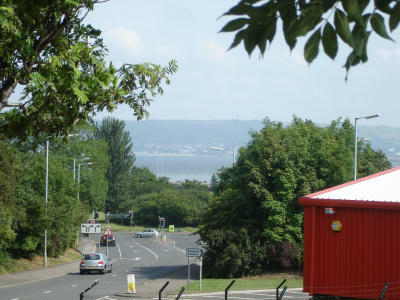 Photo: Dale Amon, all rights reserved
Photo: Dale Amon, all rights reserved
The geography of Belfast is dominated by the Belfast Lough and the hills on either side.
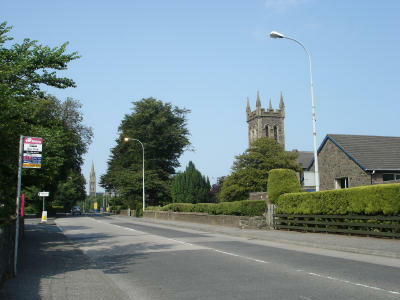 Photo: Dale Amon, all rights reserved Photo: Dale Amon, all rights reservedThere are a fair few churches about.
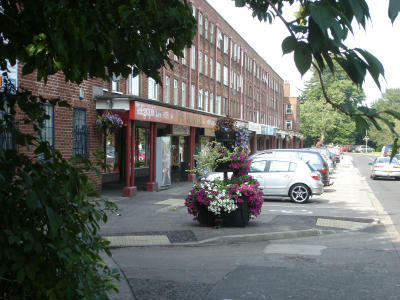 Photo: Dale Amon, all rights reserved Photo: Dale Amon, all rights reservedEven a wee neighborhood shopping center looks nice in the summer sunlight.
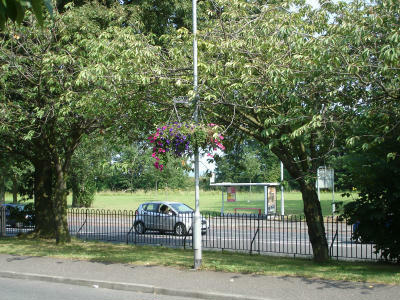 Photo: Dale Amon, all rights reserved Photo: Dale Amon, all rights reserved There are parks and parklets everywhere.
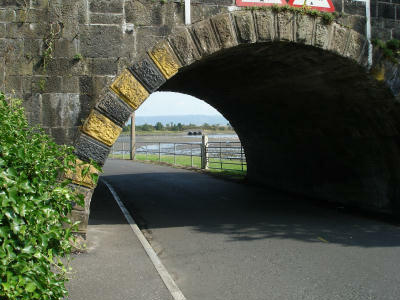 Photo: Dale Amon, all rights reserved Photo: Dale Amon, all rights reservedThere is a bird sanctuary just the other side of this railway bridge.
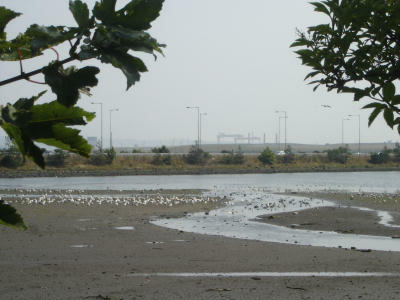 Photo: Dale Amon, all rights reserved Photo: Dale Amon, all rights reserved
If you had any doubts about the location of these photos, the Hercules and Goliath cranes at the Harland and Wolff shipyard in the far distance beyond the bird blanketed tidal flats would dispel it.
If there is any point to this article other than a hot day diversion, it is that journalists are trained to see and report what is ugly and mean in life while bloggers are free to show what is fun and beautiful and good with nary a worry about getting sacked for it.
Now… where did I put those extra icecube trays?
Slugger O’Toole has a picture and a round up of links of what the ‘bogosphere’ is saying if you are interesting in what happened in Dublin.
I received a web launch reception invite via email a couple days ago and had no particular idea why I was on the list. However, as is the case in the music world and a capital offense in that of journalism, one never, ever, passes up free food and drink.
Much to my surprise, this launch of the Britain and Ireland web site for contemporary conversations is the brain child of the British Council and our good friend Mick Fealty (Slugger O’Toole).
The new site will encourage discussion on historical and current entwinement (or entanglement) of Irish and British affairs with monthly articles as talking points. The site was introduced by Trevor Ringland and keynoted by footballer Niall Quinn. I am sure the ‘discussion as a contact sport’ I expect on this site will make even a rugby game look tame, let alone league football.
If you are interested in this part of the world, I am sure this will become a ‘must read’.
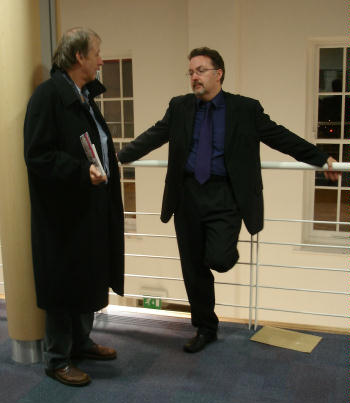 Mick Fealty practices being an amputee and nailed to a cross in preparation for discussions on Britain and Ireland Photo: Dale Amon, all rights reserved.
In the last couple days I have written, and then deleted unpublished, several articles about the IRA’s much ballyhooed decommissioning (or ‘decommissioning’, depending on what you believe to be the truth) of its weapons. In short, I am not sure what I think.
To try and make head or tail of what is going on, I have been hanging out at Slugger O’Toole.
And I still cannot figure out if it is cause to celebrate or just another ploy.
Forgive me if I am not breaking out the champagne just yet at the announcement that the ethnic collectivists of the IRA have declared their ‘armed campaign is over’. Of course the fact their ‘decommissioning’ of arms will take place in private, in marked contrast to the indecent haste with which the UK government has started very publicly ripping down its fortifications, just conforms my view that Blair is a credulous fool.
Contrary to the woolly impression some of the media’s dafter talking heads are giving (I really must stop watching early morning TV, bad for the blood pressure), the IRA is not disbanding and unless I see large piles of semtex being burned in front of Stormont, I very much doubt anything more than a token number of already unserviceable weapons and expired explosives will be put beyond their reach as an organisation.
I may not be a huge fan of the ethnic collectivists of the DUP either, but they are the ones who seem to me to be exhibiting the most appropriate amount of continuing distain for Sinn Fein/IRA and so are offering only highly contingent acknowledgement of this latest ‘breakthrough’.
My guess is there is a lot less to this that meets the eye. Like the song says: “Don’t believe the hype.”
Whilst Britain remains fixated on the aftermath of Tony Blair’s unprecedented third term victory against their intellectually bankrupt and dependably inept opponents, it would behove people in Britain to pay a bit more attention to the electoral earthquake which shook Ulster which has resulted in David Trimble’s relatively moderate Ulster Unionist Party has almost completely collapsing in favour of Ian Paisley Democratic Unionist Party.
Now that the only two significant political players locally are the two extremist parties from either side of the sectarian divide, things look like they are about to get dramatically more… interesting. The message from the Northern Ireland’s protestant majority seems pretty damn clear to me but is anyone actually listening? I have a feeling I am going to be spending a lot more time keeping tabs on what get said on Slugger O’Toole, that most indispensable source of insights for all things Northern Irish, to see how things develop.
I usually steer clear of ‘local’ stories because I will almost certainly be pilloried no matter what I say. But this is just too silly to pass up.
It seems that a sociology professor, one not from a Northern Ireland university, thinks the Red Hand of Ulster is a sectarian symbol. In most cases I would just roll my eyes and mutter about ‘outsiders’ who can not possibly be expected to understand a place as confusing as Northern Ireland.
This is not the case for the Red Hand. In fact, it is partly a symbol of some of my own ancestors: The O’Neill clan. The ‘Kings’ of Ireland. My maternal grandpa was an O’Neill and there is a wee red hand in that family coat of arms.
Now, if you please Herr Sociologist, tell me why you believe the Red Hand of Ulster is merely a sectarian Unionist symbol? Could it be you have actually never read any Northern Ireland history?
We return now to our regularly scheduled programming… and yes I do intend to post a number of photo stories from Manhattan.
Hate crime. What it is exactly? Opinions vary but in essence it means that a given crime, such as assault, murder or defamation, will be treated more seriously if the perpetrator is judged to be motivated by certain politically disfavoured prejudices.
It means that if someone smashes a bottle in your face because you are black (or catholic or muslim or homosexual), rather than because they want to steal your wallet or because they caught you in flagrante delicto with their girlfriend, then that is more serious. The actual substance of the crime is not what makes it a ‘hate’ crime, just the motivation to commit it against a member of a designated group of people based on their race (which in reality means ‘certain races’), religions (meaning ‘certain religions’) or sexual orientations (meaning ‘homosexuals’), that then becomes a hate crime… crimes against philanderers, drunks, football supporters, loud mouths etc. are not hate crimes.
You may hate supporters of Celtic Football Club but if you bash one of them over the head with a two by four, that is not a ‘hate crime’, it is just assault and perhaps GBH. Unless of course the Celtic supporter in question happens to be a nominal Catholic but you are a nominal Protestant.
It is a criminal act which attracts extra sanction because of what the perpetrator was thinking at the time. In short, a ‘hate crime’ is a ‘thought crime’, albeit one usually only applied to thoughts held by certain politically disfavoured classifications of people.
Do you really trust something as corrupt and fallible as a political process to create laws not on demonstrable facts (who hit who with the two by four) but on what people think? Sure, motivation matters: for example being put in fear of your life can justify violence in self-defence, even (sometimes) in Britain. But to legislate that certain groups are more sacrosanct than others is collectivism at its most intellectually pernicious because it denies the individual basis of rights and assigns value on the basis of group membership. We all know where that can end up.
If you think laws should be based on crimes against individuals regardless of what race/religion or sexual orientation they have, then you might want to go over to the Hansard Society on-line consultation on Hate Crime in Northern Ireland and tell them that group rights are not a form of human rights, they are their antithesis.
News of large scale arrests of criminals in Baghdad carried out by Iraqi police are welcome, provided there is due process and it is not simply a trawling operation. It does however demonstrate the differing priorities of an army of occupation versus a police force.
The International Herald Tribune article taken from the New York Times also mentions a drop in ‘spectacular’ terrorist attacks over the past three weeks. Those of us who consider that terrorist groups usually prosper in a climate of lawlessness will ponder the Iraqi situation and reflect on Northern Ireland.
There is little doubt that massive police activity will uncover some terrorist networks and disrupt potential attacks: for example raiding the home of a criminal can turn up equipment intended for terrorist actions.
In Northern Ireland all sorts of crimes, from welfare benefit fraud, fraudulent elections, fire insurance scams, drug dealing, protection rackets, unlicensed gambling and alcohol premises, contract killings and woundings, are tolerated on the grounds that the ‘peace process’ must be kept going.
For the first time in months, I get the sense that Iraq may be going in the right direction. I wish this were the case of Londonderry and Belfast. I have felt for a long time that the violence in Northern Ireland should be considered a law-enforcement problem, separate from politics.
Given that Ireland is almost a poster boy for ‘before-and-after’ for what liberalising an economy can do, it is a pity that the people who argue for continuing that process have to couch their words in defensive language. Nevertheless, the Progressive Democrats seems to be making a far better case in Ireland for freeing markets than the pointless British Tories are.
Progressive Democrats president, Mr McDowell, last night issued a rallying call to fellow Ministers to hold to the Government’s liberal economic policy agenda, saying tax-cutting and deregulation have helped transform the State.
[…]
He rejected the accusation that supporters of this way believed in the unleashing of unbridled market forces. “It is the essence of the liberal, republican tradition that the market is the servant and not the master of the people. No one I know argues that Ireland is or should be an economy rather than a society.”
“Market is the servant and not the master of the people”… but what does that actually mean? It seems to me that an economy can be social, but only when it is not political… and Ireland can only ‘be an economy, rather than a society’ if politics (i.e, manipulation of the state) has so much control over what is done as to make the economy simply an adjunct of the state and its political processes, wiping out the economic underpinnings of society and the social underpinnings of markets.
So yes, I am all in favour of people in Ireland living in a society, and the only way to do that is to have a free social market rather than a politically regulated economy.
|
Who Are We? The Samizdata people are a bunch of sinister and heavily armed globalist illuminati who seek to infect the entire world with the values of personal liberty and several property. Amongst our many crimes is a sense of humour and the intermittent use of British spelling.
We are also a varied group made up of social individualists, classical liberals, whigs, libertarians, extropians, futurists, ‘Porcupines’, Karl Popper fetishists, recovering neo-conservatives, crazed Ayn Rand worshipers, over-caffeinated Virginia Postrel devotees, witty Frédéric Bastiat wannabes, cypherpunks, minarchists, kritarchists and wild-eyed anarcho-capitalists from Britain, North America, Australia and Europe.
|











